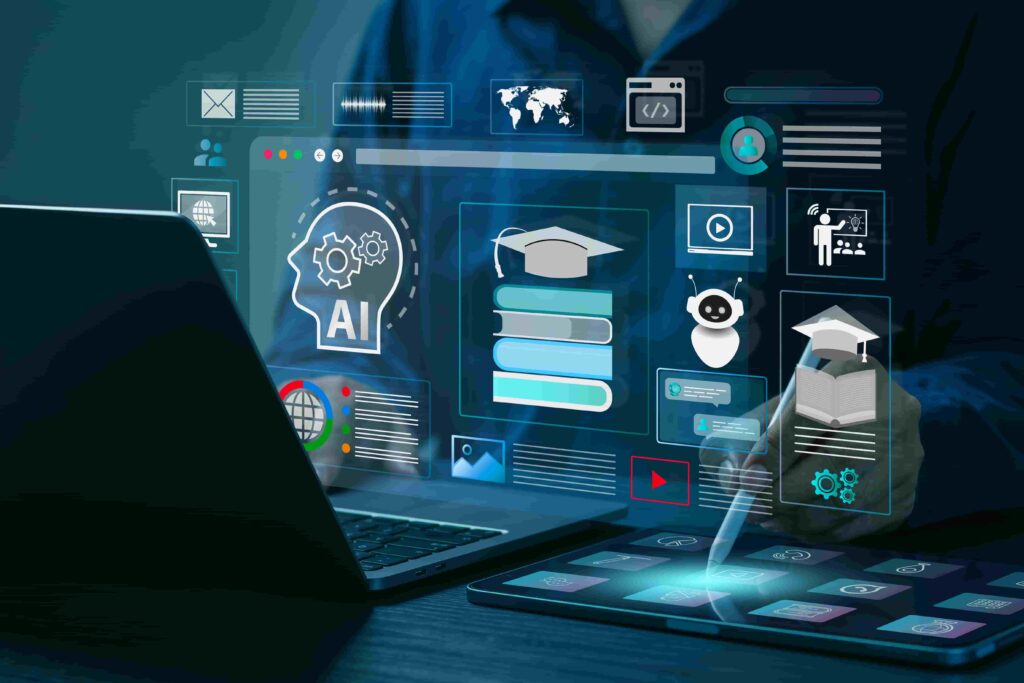Anúncios
Why Skill Building Has Become a Strategic Imperative

In today’s changing job landscape, it’s crucial to be adaptable and open to learning skills. The importance of skills enhancement has been emphasized across sectors, with companies looking for staff who excel in managing change.
Recommended Content

Make Your Skills Count: Certifications That Boost Credibility
This article delves into trends in skill building with an emphasis on the growing significance of soft skills and proficiency in digital tools.
Ready to sharpen your edge in a competitive job market? Keep reading to explore the top trends shaping the future of skill development.
The Growing Importance of Soft Skills
Soft skills, also known as “people skills,” have become more prevalent in recent times. These abilities include communication, teamwork, empathy, and problem-solving skills.
Employers are realizing that knowledge alone is not enough to thrive in today’s team-oriented workplaces.
This change has led to a renewed focus on training programs that prioritize intelligence and interpersonal skills.
Employers also aim to establish a work environment that promotes and acknowledges skills.
They recognize that an employees effective communication skills can boost productivity and enhance team relationships.
Team collaboration is often essential for meeting objectives; honed soft skills can elevate overall effectiveness.
Digital Literacy as a Core Workforce Competency
Digital literacy plays a role in today’s skill development scene. As technology evolves, there is a growing need for employees to be proficient in various digital tools and platforms.
Workers with literacy can easily adjust to new technologies, making them highly valuable to their companies. As a result, many training initiatives now include skills development to keep all employees current.
Digital literacy is more than knowing how to use software. It also involves being able to think about information and handle online communication effectively while being aware of data privacy and security concerns.
With the growing emphasis on using data for decision-making in businesses today, having employees with these competencies can make an impact on projects.
Additionally, the pandemic has hastened the demand for working tools and technologies as numerous firms swiftly shifted to hybrid work setups.
This rapid change highlighted the significance of proficiency in facilitating communication and teamwork.
It is essential to provide employees with training in these competencies to uphold productivity in the hybrid work landscape.
Embracing Continuous Learning in the Modern Workplace
In skill enhancement and professional growth, acknowledge that perpetual learning holds significance.
As work environments evolve swiftly, employees must embrace education as a practice.
Companies that nurture an environment promoting knowledge acquisition set themselves up for enduring triumph.
This transformation, in culture, inspires staff members to pursue fresh competencies and expertise, leading to mutual gains for both the individual and the corporate entity.
Employers can introduce training approaches to encourage learning among their staff members.
For example, they can provide classes, host workshops, or grant access to digital learning platforms.
These options enable employees to engage in learning activities at a pace that suits them best. Moreover, they can establish mentorship initiatives or pair team members with seasoned professionals.
These programs can further boost skill development by offering valuable learning opportunities.
Gamification and Engagement in Skill-Building

Over the years, gamification has become a method for enhancing skills development. Companies incorporate game-like elements into their training programs to boost employee engagement and motivation.
They effectively use features like points, badges, and leaderboards to make learning fun and spur friendly competition among participants.
Gamification’s attractiveness stems from its capacity to offer feedback to users. When completing tasks or challenges at work, individuals can monitor their advancement over time.
This feature can boost skill improvement and help retain knowledge. This hands-on method has the power to make learning engaging and exciting, thus fostering a mindset of development.
Teamwork and Mentorship as Accelerators of Growth
Teamwork is an aspect of skill development that is important in today’s interconnected work environment.
When individuals collaborate effectively within teams and combine their skill sets and perspectives, they often come up with solutions to challenging issues, enhancing the overall success of their projects through a diverse range of abilities.
Employers ought to consider creating atmospheres that support teamwork and foster collaborative learning initiatives within their organizations.
These can be instrumental in enhancing employee skills and fostering a sense of camaraderie among team members by encouraging functional teams to collaborate on specific projects, which allows for exposure to diverse perspectives and expertise.
Engaging in mentorship programs can also boost teamwork and skill enhancement. Arranging mentorships between staff members and seasoned mentors promotes the exchange of knowledge and career advancement.
Established mentorship bonds foster a nurturing atmosphere for learning that ultimately leads to a team.
Besides the mentorship programs being utilized nowadays, there is a growing interest in mentoring.
This method involves matching staff members with professionals to offer fresh perspectives on current trends and technologies.
Since younger individuals typically bring viewpoints and digital skills to the table, this setup encourages learning that benefits everyone involved.
Recommended Content

Your Career, Reimagined: A Practical Guide to Making the Leap
Integrating Well-Being into Skill Development
The awareness of well-being is expanding as companies acknowledge the link between employee happiness and work performance improvement; hence, integrating wellness into skill enhancement is gaining significance in the workplace, which fosters a supportive environment for employees to thrive professionally.
Encouraging mental health awareness programs and coping mechanisms in the workplace can boost team morale significantly. It helps employees feel appreciated and mentally well-balanced, which leads to increased involvement in their tasks.
Therefore, it is important for companies to provide support for stress management techniques and promote mindfulness and a healthy work-life balance to help employees develop skills.
Inclusion and Accessibility in Learning Programs
Organizations are focusing more these days on making their skills development programs inclusive through diversity and inclusion initiatives (DEIs).
It is crucial for leadership to ensure that all employees have access to these programs regardless of their background and identity so that everyone can improve their skills effectively.
Investment in initiatives that focus on diversity and inclusion fosters innovation within a workforce setting.
Such programs often result in teams generating a spectrum of ideas and solutions, which subsequently enhances overall performance and decision-making processes.
Establishing skill enhancement schemes that promote inclusivity can foster teamwork and creativity and contribute to an organization’s overall prosperity.
Generational Preferences and the Need for Flexible Learning
Employers should also consider the evolving preferences of the workforce generations entering the job market. Millennials and Gen Z value opportunities for advancement and growth when selecting an employer.
Companies prioritizing skill development are better positioned to attract individuals and foster employee retention.
Younger workers are often drawn to learning opportunities that cater to their lifestyle preferences and schedules.
Blending classes with face-to-face workshops gives them the flexibility they desire regarding training participation choices and learning methods that align with their individual preferences and needs.
Companies can guarantee that all staff members utilize skills enhancement programs by catering to various learning styles.
Lifelong Learning, Upskilling, and Business Resilience

In today’s evolving world, with shifts and technological advancements shaping the landscape of workforces globally, it is crucial for skills development initiatives to remain flexible and responsive to dynamic demands.
Businesses must consistently enhance their training programs to stay in tune with industry developments and their employees’ changing needs.
Moreover it is essential to embrace the idea of reskilling and upskilling in the workplace. As job responsibilities change over time workers might have to learn skills or improve their current expertise.
Companies that focus on reskilling and upskilling show their dedication to workforce development and help create an environment.
Embracing Skill Development for Long-Term Success
Ultimately, and to sum up, enhancing skills is crucial in the dynamic job market landscape we face today!
With the rising need for skills and digital proficiency, it’s imperative that companies focus on educational initiatives that nurture these talents effectively.
By embracing learning opportunities alongside teamwork efforts and incorporating gamification and diversity, equity, and inclusion programs into their strategies, organizations can significantly boost their employees’ skill sets and create a culture that thrives on progress and fresh ideas.
Businesses that prioritize enhancing their employees abilities not excel but foster a more dedicated and inspired team members.
By embracing the potential of improving skills, companies can adeptly adapt to changes and set themselves up for lasting triumph in a competitive environment.
Organizations must reevaluate their approaches to skill development now and guarantee they stay pertinent and impactful amid the circumstances.
Want to build a workforce that grows with change? Stay ahead by embracing continuous learning and starting to transform your team today.
Recommended Content
